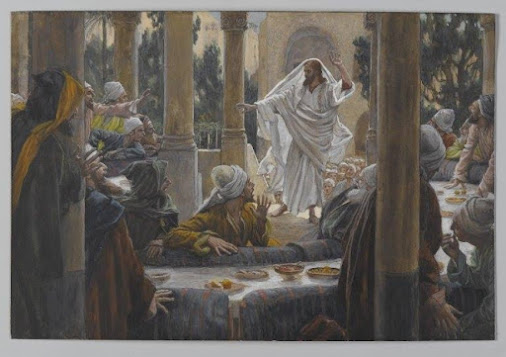The Synagogue at Capernaum
Jesus rebuked him and said, “Be quiet! Come out of him!”
Not a complex ritual, nor a litany of endless prayer, but rather with a simple and direct word of command he cast out the demon.
The crowd could not help but be amazed. They sensed something different about his words than the words of others. He spoke with authority that could command both storms and spirits, who had no choice but to obey. When he responded to the officers who came to arrest him saying, "I am He," the officers fell to the ground at the sound of that voice (see John 18:6). It was this voice that could say "little girl, arise!" (see Mark 5:41), and "Lazarus, come out!" (see John 11:43). Even those who slept in death were able to hear that voice and were compelled to obey.
In Jesus we saw the utter difference between the divine word and the words of those who were merely human beings. This was not, however, a story of merely historical interest, as though the Word who spoke these words had merely come and gone. It is rather now that his Church possesses this same word, and speaks with this same power. That is why we read earlier in the week that Paul gave thanks that the Thessalonians "received not a human word but, as it truly is, the word of God, which is now at work in you who believe" (see First Thessalonians 2:13).
Is it easier to accept that this Word is present in the Church than that the power contained in the Word is also present? Do we think, 'Oh sure, revelation is in the heart of the Church', but also 'The Church seems ineffective and powerless in the world'? Yet there is a perfect coinherence between the Word and his power.
If the Spirit of him who raised Jesus from the dead dwells in you, he who raised Christ Jesus from the dead will also give life to your mortal bodies through his Spirit who dwells in you (see Romans 8:11).
If, as is often the case, we do not witness the power of the Word calming storms and casting out demons in our own day it is most likely because we receiving it poorly, as a merely human word. It is often true that those who speak it speak it as if that were so, raising the difficulty for us to hear it well. Yet the word cannot be fully covered over or contained even by the weak human vessels meant to convey it to the world. We are always free, and the Spirit is always ready to help us, to listen well, and receive it as a Word of truth and power.
They were all amazed and said to one another,
“What is there about his word?
For with authority and power he commands the unclean spirits,
and they come out.”
We are not in darkness, for the day of the Lord to overtake us like a thief, to the degree that the Word of God as a lamp for our feet and a light for our paths (see Psalm 119:105). The animating life force of the Word is the Spirit whom we ourselves have been given, a gift that we should constantly seek to fan into flames (see Second Timothy 1:6). Then we will be like the wise virgins (see Matthew 25:1-13), with peace during the hours of darkness, and confidence at the appearing of the bridegroom (see First John 2:28).
For God did not destine us for wrath,
but to gain salvation through our Lord Jesus Christ,
who died for us, so that whether we are awake or asleep
we may live together with him.
We are not meant to go alone on this pilgrimage. It is only by other Spirit filled disciples that our own insufficiencies can be made good, and we in turn have much to offer. To the degree that all of us have received a share of the anointing and a share of the Word we are called to share it with others, to use it to build them up.
Therefore, encourage one another and build one another up,
as indeed you do.













